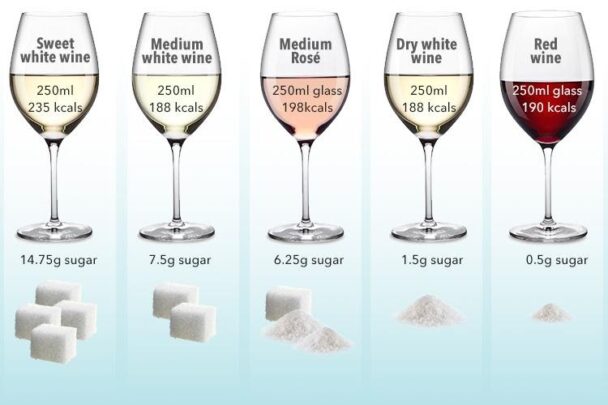It’s no secret that some wines can contain a significant amount of calories, but what about sugar? The sugar content in wine varies widely by type – some have lots of sugar, whilst some have hardly any. However, picking out low sugar varieties can be time consuming and confusing. To help you out, we’ve put together this blog to give you a head start in identifying which types of wine have less sugar (but don’t forget, all of DrinkWell’s wines have been carefully selected for their low or zero sugar content!).
Most rosé wines are sweet and fruity, and therefore have a high sugar content. They are therefore generally richer in carbohydrates and calories than red or dry white wines. For example, a glass of sweet rosé contains between 95 and 125 calories, and between 1.5 g and 5.5 g of carbohydrates.

What Colour Wine Has the Lowest Sugar Content?
Generally speaking, red wine has the lowest sugar content, with an average of around 0.9g per serving. White wines will usually have around 1.4g of sugar per serving, although this varies by type. Given its sweet nature, it will come as no surprise to learn that a glass of rose could include a huge 21g to 72g of sugar.
However, you shouldn’t base your choice purely on sugar content. There are many other factors to consider when evaluating the health implications of different wines. Take red wine, for example. Whilst it may have the lowest sugar content, red wines tend to have a higher overall calorie content than other wines, partly due to its higher alcohol content. It’s best to understand the whole picture when determining which wine is right for your needs.
- 2023s Best Wines
- £139.99
Customer Favourites Case
Appropriately named as were always re-stocking each of the bottles within this case. Weve put together … read more
Which Varieties of Wine Have the Lowest Sugar Content?
Most winemakers don’t tend to include the precise sugar content on the labelling of their wines, so it can be difficult to know how much sugar is in each bottle. We’ve created this handy guide to the average sugar content in popular wines from around the world to help you out:
|
Wine |
Approximate sugar content |
|
Sauvignon Blanc |
0.75 per glass (3.75g per bottle) |
|
Malbec |
1.5g per glass (7.5g per bottle) |
|
Merlot |
1g per glass (5g per bottle) |
|
Pinot Grigio |
1g per glass (5g per bottle) |
|
Chardonnay |
0.9g per glass (4.5g per bottle) |
|
Pinot Noir |
1g per glass (5g per bottle) |
|
Prosecco |
1g per glass (5g per bottle) |
|
White Moscato |
2g per glass (10g per bottle) |
|
White Zinfandel |
1.5g per glass (7.5g per bottle) |
Helpfully, labelling terms have been set up that are based on the amount of residual sugar that wine contains:
- ‘Dry/Sec’: Up to 4g/l
- Medium dry/demi-sec: 4 g/l – 12 g/l
- Medium (Medium Sweet): 12 g/l – 45 g/l
- Sweet/Doux: More than 45 g/l
New research on wine, sugar and your health
FAQ
What wine is lowest in sugar?
How much sugar is in rose wine?
How many teaspoons of sugar are in a bottle of rose wine?
Is Rose Wine the healthiest?
Does rosé wine have sugar?
Because, although often demonised for its high sugar content – sadly, that sweet taste doesn’t come from anywhere – there’s a new generation of rosé wines that are actually low in sugar. Think less than 1g/l. ( BTW, broccoli has around 1.5g per cup. And although these sugars aren’t equal, it does put it into perspective.) Is rosé wine unhealthy?
How much sugar is present in red grapes?
Red grapes have approximately 25 grams of sugar in 100 grams of fruit. Rich in bioactive compounds with beneficial health properties that help prevent disease and reduce inflammation.
Why are rosé wines sweet?
To produce a sweet or a semi-sweet rosé wines, grapes are not soaked in the liquid as long. The juice will have fewer tannins, and tannins increase the dryness in wines. Rosé wines are sweeter naturally because of the low tannins.
Does wine have residual sugar?
The sugars leftover contribute to the total carbohydrate in the beverage, which varies from one drink to another. A dry wine has little to no residual sugar, whereas a sweet wine can have quite a bit. Liqueurs have added sugar, often quite a lot. Calories and carbs in wine from residual sugar (RS).
